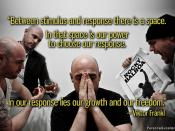Man's Individual Meaning
World War II and the Holocaust were terrible times in the history of the world. There have been many novels and poems written by survivors of Nazi concentration camps. The majority of those works centered on the repulsive acts that existed in the camps. While Viktor Frankl's Man's Search for Meaning does include accounts of the tragedies that occurred, he uses them to explain how he developed his branch of therapy: Logotherapy.
Developed the term "logotherapy" from the Greek word Logos, which can be translated to "meaning." In logotherapy, the focus is "on the meaning of human existence as well as on man's search for such meaning (Frankl 121)." The various and numerous encounters that Frankl relates to readers, clarifies and elucidates to them what his motivations were to begin practicing logotherapy.
In the first paragraph of Man's Search for Meaning, Frankl states "This tale is not concerned with the great horrors, which have already been described enough ...
it will try to answer the question: How was everyday life in a concentration camp reflected in the mind of the average prisoner (Frankl 21)?" That is exactly what he does; Frankl gives an assortment of examples of situations when not only the limits of the prisoners' bodies, but also their minds, are tested.
One case given, is a hut crowded with seventy sick men, men who were happy simply because they "did not have to leave camp for work; ... did not have to go on parade (Frankl 68)." This shows that the lives of the prisoners were reduced to such a low that being ill, receiving smaller portions of already inadequate amount of bread and soup, and not being forced to work and "go on parade" was cause for joy. They were satisfied, regardless...


